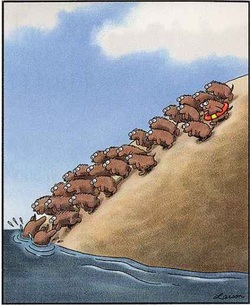
There is safety in numbers.
______________________________
DBW 2014: Survey Finds Most Authors Want to Earn More
Publishers Weekly, Jan 15, 2014
The Digital Book World/Writer's Digest 2014 survey, discussed at the organization's New York event this week, found that, in spite of the growing popularity of self-publishing, many authors would, given the chance, still opt for a traditional book deal.
Just over 9,200 authors responded to the survey, and they fall into four categories: aspiring (not yet published in any manner); self-published (have never worked with a traditional publisher); traditionally published (have only been published by a traditional house); and hybrid (have had experience self-publishing and have also been published by a traditional house). The survey, which is available for purchase at the DBW store, focuses on commercial fiction writers who are not treating their writing as a full-time job, and would like to be making more money from their writing.
Among some of the big picture takeaways from the survey are that, despite some negative impressions of traditional publishing, it remains the route many authors would like to pursue. Although the sampled authors felt traditional publishing offers less creative freedom, what it provides in other areas--namely marketing, distribution and editorial support--is a positive that outweighs the negative.
DBW found that the traditionally-published authors surveyed felt traditional publishing offered "lackluster" experience relative to what they hoped for, and expected.
Among hybrid authors surveyed, DBW said they were showing a "pattern of movement" from traditional houses to self-publishing. The DBW survey highlighted a familiar tale of the traditionally-published author who, unhappy with his or her treatment/sales/revenue, opts for self-publishing, which offers a much higher royalty rate. Among these hybrid authors, there was more satisfaction with self-publishing, and only 16.1% of this group, DBW found, said they intended to go back to traditional publishing.
Most of the authors in the DBW sample who had been traditionally published did not receive an advance, and almost all of the authors interviewed identified advances as a benefit of traditional publishing. Also, interestingly, DBW found that there was not a significant discrepancy in sales among authors in the survey who self-published and those who were traditionally published.
Overall, DBW found, these authors were not happy with their sales period. As the survey notes: "Neither mode of publishing, it seems, provided authors with what they hoped in terms of sales, earnings, distribution, or marketing."
Read the full article HERE.
 RSS Feed
RSS Feed